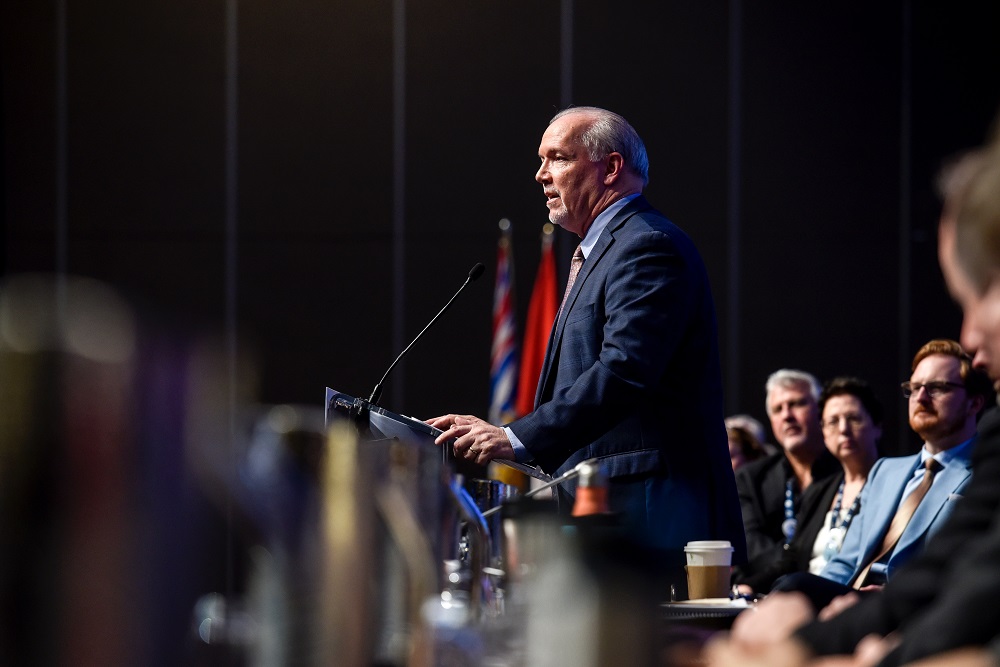From Trent to the BC Legislature: The Activism of John Horgan '79
The former premier of British Columbia traces his political path from student activist to political leader
August 3, 2023

When former premier of British Columbia John Horgan '79 (Peter Robinson College) looks back on his career in politics, there two Trent University memories that he credits to his political awakening. The first is hearing Canadian politician Tommy Douglas give a lecture in Wenjack Theatre, which inspired him to change his major from Psychology to History and Canadian Studies. The second, ironically, was a failed attempt at protest.
"I had a picture in my office," he recalls. "It was a picture of [future wife and fellow Trent alumna Ellie nee Mast '79 (Peter Robinson College)] and I in front of Peter Robinson College with our homemade protest signs saying, 'Stop the Cuts!' If I hadn't missed the bus, I would've been in an occupation of the President's Office in my time at Trent. It was part and parcel of the awakening of my political awareness."
Horgan spent over seventeen years as a Member of the Legislative Assembly for the Langford-Juan de Fuca riding in B.C., including five years as premier of the province. Reflecting on those years, he recalls several touchstone moments that connect him to the University, and to the faculty and students he shared time with. He still calls his Trent experience "vital" to his career, "with the people that are lifetime friends, who I still engage with, it was transformative."
In talking about his legacy as premier, in the most recent issue of TRENT Magazine, Horgan is quick to reference fellow alumni.
"It was a very activist government, without any doubt," he says. "Including other Trent grads. Nathan Cullen '94 (Julian Blackburn College), Sheila Malcolmson '85 (Champlain College) both Trent alum who were in my cabinet and continue to serve as cabinet ministers here in BC."
Horgan’s career highlights include eliminating medical service plan premiums, and overhauling the Insurance Corporation of British Columbia, delivering lower car insurance rates and even rebates to motorists. While he worked hard "on re-balancing labour laws, on environmental policies… and looking at the forest industry, the foundational industry in British Columbia," he may well be most remembered for enshrining the United Nations Declaration on the Rights of Indigenous Peoples into law.
"The Declaration would be the pinnacle," he notes. "Ensuring Indigenous rights and title, which has been an issue in British Columbia since European expansion, and not resolved as it had been in other provinces over time. To make progress on social and economic justice for First Peoples in BC was very important to me."
Looking at the present and future of politics in Canada, the former premier continues to promote active change.
"I would urge anyone in other parts of the country to start looking at our politics differently," he explains. "Not as left and right, but as progress and no progress. And that doesn't mean instinctively progressive either. I think there's space in government to make good choices, left and right (if we have to be linear). But at the end of the day, we have to look at our circumstances and provide the services that people need in order to meet the challenges of modernity."
Excerpts from this interview originally appeared in the Spring 2023 issue of TRENT Magazine; the full-length interview is available in podcast form on Trent Voices. Interested in receiving future print editions of TRENT Magazine? Please complete a request form to be included in upcoming distributions.
For more Trent University alumni news, visit trentu.ca/alumni; and follow us on social media: The Trent University Alumni Association page on Facebook, @trent_alumni on Instagram, and Trent University Alumni Association on LinkedIN